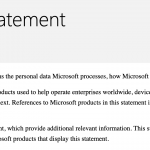
Another Confused Entry in the Social Media Account Ownership Jurisprudence–JLM v. Gutman
This is a lawsuit between a wedding gown company, JLM, and Hayley Paige Gutman, a designer/influencer who worked for JLM. For background, check out my post on the district court’s ruling here: “Social Media Ownership Disputes Part II: Bridal Wear…

Yearbook Defendants Lose Two More Section 230 Rulings
2021 has seen the emergence of a litigation genre against “yearbook” database vendors that publish old yearbooks online. I’ve blogged three yearbook cases so far this year (Callahan v. Ancestry, Knapke v. Classmates, and Sessa v. Ancestry), and today I’ll…

Yearbook Database Cases Are Vexing the Courts–Sessa v. Ancestry
This is another entry in the genre of publicity rights cases against commercial databases vending information about people. Courts are struggling with how to analyze these cases, especially in the context of paywalled yearbook databases. This ruling turns into a…

Third Circuit Says Section 230 Doesn’t Apply to Publicity Rights Claims–Hepp v. Facebook
The Third Circuit ruled today that Section 230 doesn’t preempt publicity rights claims because they qualify as “intellectual property” claims. This ruling directly conflicts with the Ninth Circuit’s rule, which says that all state IP claims are preempted by Section…

Court Casts Doubt on the Legality of the Data Brokerage Industry–Brooks v. Thomson Reuters
Thomson Reuters (TR) offers a database called “CLEAR” that assembles personal information into individual dossiers. The plaintiffs are Black civil rights activists leading a class action lawsuit for publicity rights and related claims. The court denies TR’s motion to dismiss–in…

Section 230 Doesn’t Protect Yearbook Website’s Ads–Knapke v. Classmates
Classmates offers paywalled access to yearbook info. Classmates allows free searches, and the “search results provide a free preview of the services and products with a photo and name of an individual to entice the user to purchase Classmates’ services…

Trump Defeats Lawsuit Over Manipulated Viral Video He Tweeted–Cisneros v. Cook
This case relates to a joyous and heartwarming video you’ve probably seen, where two 2-year-old boys–one black, one white–run up to each other, give each other a big hug like they are long-lost friends, and then run down the sidewalk…

‘365 for Business’ Users’ Privacy Lawsuit Dismissed–Russo v. Microsoft
Users of “Microsoft 365 For Business” allege oversharing by Microsoft, which translates into claims under (1) the Wiretap Act and the Stored Communications Act; (2) Washington’s Consumer Protection Act; (3) the Washington one-party consent phone statute; and (4) common law….
Should We Adopt a Notice-and-Takedown Scheme for Deepfakes and Other Inauthentic Media?
Prof. Christa Laser (Cleveland-Marshall) and I engaged in a point/counterpoint about legal mechanisms to address inauthentic recordings and photos, including AI-assisted forged videos (a/k/a “deepfakes”). She argued for a notice-and-takedown scheme in some circumstances, including those creating fake pornographic images….

Ohio Bans Competitive Keyword Advertising by Lawyers
No one: Absolutely no one: Ohio Board of Professional Conduct (in the third decade of the 21st century….): * * * I guess we’re doing this again. It’s 2021, long past the time consumers have come to understand competitive keyword…
